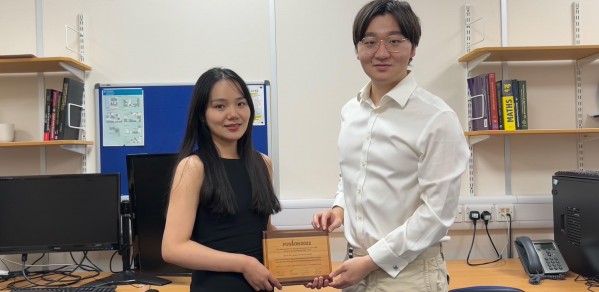
Qing Li (Lily), Runze Gan (Patrick) and their supervisor Simon Godsill, Professor of Statistical Signal Processing, are joint winners of the Best Student Paper Award at Fusion 2022 with their paper: A Variational Bayes Association-based Multi-object Tracker under the Non-homogeneous Poisson Measurement Process.
Scalable and versatile, this multi-object tracker can adapt to different tracking scenarios, thereby minimising safety hazards in applications such as drones or self-driving vehicles with diverse terrain and weather conditions.
Qing Li and Runze Gan
Tracking multiple moving objects based on the noisy data from sensors (e.g. GPS, radar, and cameras) is essential to various practical applications including autonomous driving, disaster response, wide-area surveillance, and cell motility analysis. The challenge of such a task is that typically we do not know which data is measured from which object, or whether it is measured from a fixed obstacle or environmental noise. The authors develop an efficient and extensible framework to tackle such a multi-object tracking problem by advanced statistics and machine learning techniques. “Scalable and versatile, this multi-object tracker can adapt to different tracking scenarios, thereby minimising safety hazards in applications such as drones or self-driving vehicles with diverse terrain and weather conditions, ” said Qing and Runze. This research was presented and won the best student paper award at the flagship conference in tracking domain, Fusion 2022 which is the 25th International Conference on Information Fusion held in July in Linkoping, Sweden.
Titled ''A Variational Bayes Association-based Multi-object Tracker under the Non-homogeneous Poisson Measurement Process'', this paper designs a high-performance algorithm to track multiple objects in real-time. By leveraging the technique called variational Bayes and a statistical tool of the Poisson process, it provides an elegant solution to the so-called ''data association'' problem, which is a prohibitive hurdle of real-time object tracking. “Our method features a scalable computation ability to locate each target in parallel and to determine each measurement association simultaneously, while conventional tracking algorithms are operationally limited by the number of targets and measurements,” said Qing. “Our algorithm is further accelerated by approximate inference paradigms based on variational Bayes, under which our tracker is superior to other competing tracking algorithms in terms of both implementation efficiency and tracking accuracy.”
“The developed tracking framework is highly versatile and has many extensions,” said Runze. “ For example, our method can deal with more challenging tracking tasks where there are adversarial objects that may perform a sequence of evasive maneuvers. Besides this, the algorithm can simultaneously learn the background information of the tracking environment, such as obstacle layout and sensor characteristics. This higher level understanding of the tracking scene can in turn improve the tracking accuracy. Moreover, the developed framework allows us to predict moving objects' intentions or destinations. This is of great importance to applications such as surveillance and automation, where we can be notified ahead of time if there is a suspicious object having a malicious intent or coming into a prohibited zone. ”
This work is under the project “SIGNetS: signal and information gathering for networked surveillance" aiming to address fundamental challenges associated with information processing and fusion in a network of sensors that have limited communication abilities and localised computational resources. “Our next step is to develop new distributed sensors fusion algorithm based on the developed scalable tracking framework, ” said Qing and Runze. “ We aim to provide an innovative information processing technique to improve localisation, situational awareness and latent intent prediction with the support of sensor network. ”
Reference:
Gan, Runze, Qing Li, and Simon Godsill. "A Variational Bayes Association-based Multi-object Tracker under the Non-homogeneous Poisson Measurement Process." 2022 25th International Conference on Information Fusion. IEEE, 2022. DOI: 10.23919/FUSION49751.2022.9841303

